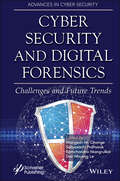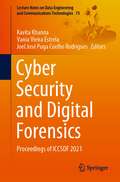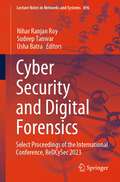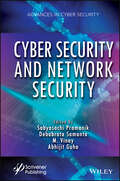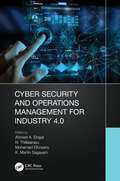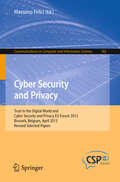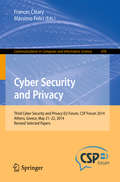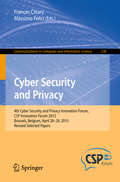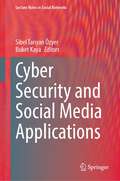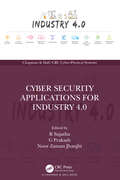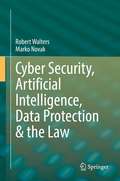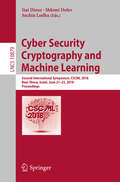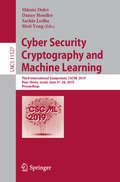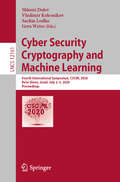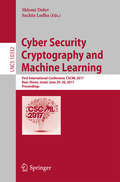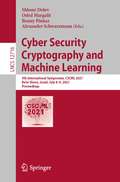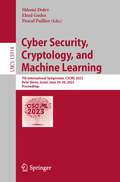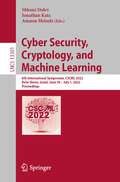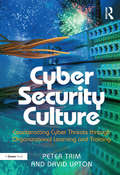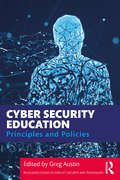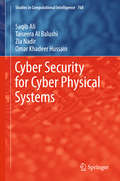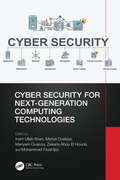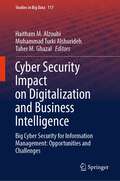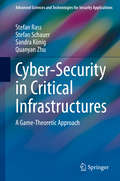- Table View
- List View
Cyber Security and Digital Forensics (Advances in Cyber Security)
by Mangesh M. Ghonge Sabyasachi Pramanik Ramchandra Mangrulkar Dac-Nhuong LeCYBER SECURITY AND DIGITAL FORENSICS Cyber security is an incredibly important issue that is constantly changing, with new methods, processes, and technologies coming online all the time. Books like this are invaluable to professionals working in this area, to stay abreast of all of these changes. Current cyber threats are getting more complicated and advanced with the rapid evolution of adversarial techniques. Networked computing and portable electronic devices have broadened the role of digital forensics beyond traditional investigations into computer crime. The overall increase in the use of computers as a way of storing and retrieving high-security information requires appropriate security measures to protect the entire computing and communication scenario worldwide. Further, with the introduction of the internet and its underlying technology, facets of information security are becoming a primary concern to protect networks and cyber infrastructures from various threats. This groundbreaking new volume, written and edited by a wide range of professionals in this area, covers broad technical and socio-economic perspectives for the utilization of information and communication technologies and the development of practical solutions in cyber security and digital forensics. Not just for the professional working in the field, but also for the student or academic on the university level, this is a must-have for any library. Audience: Practitioners, consultants, engineers, academics, and other professionals working in the areas of cyber analysis, cyber security, homeland security, national defense, the protection of national critical infrastructures, cyber-crime, cyber vulnerabilities, cyber-attacks related to network systems, cyber threat reduction planning, and those who provide leadership in cyber security management both in public and private sectors
Cyber Security and Digital Forensics: Proceedings of ICCSDF 2021 (Lecture Notes on Data Engineering and Communications Technologies #73)
by Kavita Khanna Vania Vieira Estrela Joel José Puga Coelho RodriguesThis book features high-quality research papers presented at the International Conference on Applications and Techniques in Cyber Security and Digital Forensics (ICCSDF 2021), held at The NorthCap University, Gurugram, Haryana, India, during April 3–4, 2021. This book discusses the topics ranging from information security to cryptography, mobile application attacks to digital forensics, and from cyber security to blockchain. The goal of the book is to provide 360-degree view of cybersecurity to the readers which include cyber security issues, threats, vulnerabilities, novel idea, latest technique and technology, and mitigation of threats and attacks along with demonstration of practical applications. This book also highlights the latest development, challenges, methodologies as well as other emerging areas in this field. It brings current understanding of common Web vulnerabilities while maintaining awareness and knowledge of contemporary standards, practices, procedures, and methods of Open Web Application Security Project. It also expounds how to recover information after a cybercrime.
Cyber Security and Digital Forensics: Select Proceedings of the International Conference, ReDCySec 2023 (Lecture Notes in Networks and Systems #896)
by Nihar Ranjan Roy Sudeep Tanwar Usha BatraThe book contains peer-reviewed papers from the International Conference on Recent Developments in Cyber Security organized by the Center for Cyber Security and Cryptology at Sharda University in June 2023. This volume focuses on privacy and secrecy of information, cryptography, applications and analysis, cyber threat intelligence and mitigation, cyber-physical systems, cyber threat intelligence, quantum cryptography and blockchain technologies and their application, etc. This book is a unique collection of chapters from different areas with a common theme and will be immensely useful to academic researchers and practitioners in the industry.
Cyber Security and Network Security (Advances in Cyber Security)
by Sabyasachi Pramanik Debabrata Samanta M. Vinay Abhijit GuhaCYBER SECUTIRY AND NETWORK SECURITY Written and edited by a team of experts in the field, this is the most comprehensive and up-to-date study of the practical applications of cyber security and network security for engineers, scientists, students, and other professionals. Digital assaults are quickly becoming one of the most predominant issues on the planet. As digital wrongdoing keeps on expanding, it is increasingly more important to investigate new methodologies and advances that help guarantee the security of online networks. Ongoing advances and innovations have made great advances for taking care of security issues in a methodical manner. In light of this, organized security innovations have been delivered so as to guarantee the security of programming and correspondence functionalities at fundamental, improved, and engineering levels. This outstanding new volume covers all of the latest advances, innovations, and developments in practical applications for cybersecurity and network security. This team of editors represents some of the most well-known and respected experts in the area, creating this comprehensive, up-to-date coverage of the issues of the day and state of the art. Whether for the veteran engineer or scientist or a student, this volume is a must-have for any library.
Cyber Security and Operations Management for Industry 4.0
by Ahmed A ElngarThis book seamlessly connects the topics of Industry 4.0 and cyber security. It discusses the risks and solutions of using cyber security techniques for Industry 4.0.Cyber Security and Operations Management for Industry 4.0 covers the cyber security risks involved in the integration of Industry 4.0 into businesses and highlights the issues and solutions. The book offers the latest theoretical and practical research in the management of cyber security issues common in Industry 4.0 and also discusses the ethical and legal perspectives of incorporating cyber security techniques and applications into the day-to-day functions of an organization. Industrial management topics related to smart factories, operations research, and value chains are also discussed.This book is ideal for industry professionals, researchers, and those in academia who are interested in learning more about how cyber security and Industry 4.0 are related and can work together.
Cyber Security and Privacy: Trust in the Digital World and Cyber Security and Privacy EU Forum 2013, Brussels, Belgium, April 2013, Revised Selected Papers (Communications in Computer and Information Science #182)
by Massimo FeliciThis book constitutes the thoroughly refereed, selected papers on Cyber Security and Privacy EU Forum 2013, held in Belgium, in April 2013. The 14 revised full papers presented were carefully reviewed and selected from various submissions. The papers are organized in topical sections on cloud computing, security and privacy management, security and privacy technology, security and privacy policy.
Cyber Security and Privacy: Third Cyber Security and Privacy EU Forum, CSP Forum 2014, Athens, Greece, May 21-22, 2014, Revised Selected Papers (Communications in Computer and Information Science #470)
by Massimo Felici Frances ClearyThis book constitutes the thoroughly refereed selected papers on the 4th Cyber Security and Privacy Innovation Forum, CSP Forum 2015, held in Brussels, Belgium, in April 2015. The 12 revised full papers presented were carefully reviewed and selected from various submissions. The papers are organized in topical sections such as security and privacy in the cloud; security and privacy technologies; risk and trust; research and innovation in cyber security and privacy.
Cyber Security and Privacy: 4th Cyber Security and Privacy Innovation Forum, CSP Innovation Forum 2015, Brussels, Belgium April 28-29, 2015, Revised Selected Papers (Communications in Computer and Information Science #530)
by Massimo Felici Frances ClearyThis book constitutes the thoroughly refereed selected papers on the 4th Cyber Security and Privacy Innovation Forum, CSP Forum 2015, held in Brussels, Belgium, in April 2015. The 12 revised full papers presented were carefully reviewed and selected from various submissions. The papers are organized in topical sections such as security and privacy in the cloud; security and privacy technologies; risk and trust; research and innovation in cyber security and privacy.
Cyber Security and Social Media Applications (Lecture Notes in Social Networks)
by Sibel Tarıyan Özyer Buket KayaThis book offers an excellent source of knowledge for readers who are interested in keeping up with the developments in the field of cyber security and social media analysis. It covers the possibility of using augmented reality to monitor cyber security feeds in a multitasking environment. It describes a real-time scheduled security scanner. E-commerce concept labeling is tackled by introducing a lightweight global taxonomy induction system. Blogsphere analytics and online video narratives and networks are explored. The effect of global and local network structure, credibility based prevention of fake news dissemination, and detection of trending topics and influence from social media are investigated.This book helps the reader in developing their own perspective about how to deal with cyber security and how to benefit from the development in technology to tackle cyber security issues. The reader of this book will realize how to use various machine learning techniques for tackling various applications involving social medial analysis.
Cyber Security and the Politics of Time
by Tim Stevens'Cyber security' is a recent addition to the global security agenda, concerned with protecting states and citizens from the misuse of computer networks for war, terrorism, economic espionage and criminal gain. Many argue that the ubiquity of computer networks calls for robust and pervasive countermeasures, not least governments concerned at their potential effects on national and economic security. Drawing on critical literature in international relations, security studies, political theory and social theory, this is the first book that describes how these visions of future cyber security are sustained in the communities that articulate them. Specifically, it shows that conceptions of time and temporality are foundational to the politics of cyber security. It explores how cyber security communities understand the past, present and future, thereby shaping cyber security as a political practice. Integrating a wide range of conceptual and empirical resources, this innovative book provides insight for scholars, practitioners and policymakers.
Cyber Security Applications for Industry 4.0 (Chapman & Hall/CRC Cyber-Physical Systems)
by R Sujatha G Prakash Noor Zaman JhanjhiCyber Security Applications for Industry 4.0 (CSAI 4.0) provides integrated features of various disciplines in Computer Science, Mechanical, Electrical, and Electronics Engineering which are defined to be Smart systems. It is paramount that Cyber-Physical Systems (CPS) provide accurate, real-time monitoring and control for smart applications and services. With better access to information from real-time manufacturing systems in industrial sectors, the CPS aim to increase the overall equipment effectiveness, reduce costs, and improve efficiency. Industry 4.0 technologies are already enabling numerous applications in a variety of industries. Nonetheless, legacy systems and inherent vulnerabilities in an organization's technology, including limited security mechanisms and logs, make the move to smart systems particularly challenging. Features: Proposes a conceptual framework for Industry 4.0-based Cyber Security Applications concerning the implementation aspect Creates new business models for Industrialists on Control Systems and provides productive workforce transformation Outlines the potential development and organization of Data Protection based on strategies of cybersecurity features and planning to work in the new area of Industry 4.0 Addresses the protection of plants from the frost and insects, automatic hydroponic irrigation techniques, smart industrial farming and crop management in agriculture relating to data security initiatives The book is primarily aimed at industry professionals, academicians, and researchers for a better understanding of the secure data transition between the Industry 4.0 enabled connected systems and their limitations
Cyber Security, Artificial Intelligence, Data Protection & the Law
by Robert Walters Marko NovakThis book provides a comparison and practical guide of the data protection laws of Canada, China (Hong Kong, Macau, Taiwan), Laos, Philippines, South Korea, United States and Vietnam. The book builds on the first book Data Protection Law. A Comparative Analysis of Asia-Pacific and European Approaches, Robert Walters, Leon Trakman, Bruno Zeller. As the world comes to terms with Artificial Intelligence (AI), which now pervades the daily lives of everyone. For instance, our smart or Iphone, and smart home technology (robots, televisions, fridges and toys) access our personal data at an unprecedented level. Therefore, the security of that data is increasingly more vulnerable and can be compromised. This book examines the interface of cyber security, AI and data protection. It highlights and recommends that regulators and governments need to undertake wider research and law reform to ensure the most vulnerable in the community have their personal data protected adequately, while balancing the future benefits of the digital economy.
Cyber Security Cryptography and Machine Learning: Second International Symposium, CSCML 2018, Beer Sheva, Israel, June 21–22, 2018, Proceedings (Lecture Notes in Computer Science #10879)
by Itai Dinur Shlomi Dolev Sachin LodhaThis book constitutes the refereed proceedings of the Second International Symposium on Cyber Security Cryptography and Machine Learning, CSCML 2018, held in Beer-Sheva, Israel, in June 2018. The 16 full and 6 short papers presented in this volume were carefully reviewed and selected from 44 submissions. They deal with the theory, design, analysis, implementation, or application of cyber security, cryptography and machine learning systems and networks, and conceptually innovative topics in the scope.
Cyber Security Cryptography and Machine Learning: Third International Symposium, CSCML 2019, Beer-Sheva, Israel, June 27–28, 2019, Proceedings (Lecture Notes in Computer Science #11527)
by Shlomi Dolev Danny Hendler Sachin Lodha Moti YungThis book constitutes the refereed proceedings of the Third International Symposium on Cyber Security Cryptography and Machine Learning, CSCML 2019, held in Beer-Sheva, Israel, in June 2019.The 18 full and 10 short papers presented in this volume were carefully reviewed and selected from 36 submissions. They deal with the theory, design, analysis, implementation, or application of cyber security, cryptography and machine learning systems and networks, and conceptually innovative topics in these research areas.
Cyber Security Cryptography and Machine Learning: Fourth International Symposium, CSCML 2020, Be'er Sheva, Israel, July 2–3, 2020, Proceedings (Lecture Notes in Computer Science #12161)
by Shlomi Dolev Vladimir Kolesnikov Sachin Lodha Gera WeissThis book constitutes the refereed proceedings of the Fourth International Symposium on Cyber Security Cryptography and Machine Learning, CSCML 2020, held in Beer-Sheva, Israel, in July 2020.The 12 full and 4 short papers presented in this volume were carefully reviewed and selected from 38 submissions. They deal with the theory, design, analysis, implementation, or application of cyber security, cryptography and machine learning systems and networks, and conceptually innovative topics in these research areas.
Cyber Security Cryptography and Machine Learning: First International Conference, CSCML 2017, Beer-Sheva, Israel, June 29-30, 2017, Proceedings (Lecture Notes in Computer Science #10332)
by Shlomi Dolev Sachin LodhaThis book constitutes the proceedings of the first International Symposium on Cyber Security Cryptography and Machine Learning, held in Beer-Sheva, Israel, in June 2017. The 17 full and 4 short papers presented include cyber security; secure software development methodologies, formal methods semantics and verification of secure systems; fault tolerance, reliability, availability of distributed secure systems; game-theoretic approaches to secure computing; automatic recovery of self-stabilizing and self-organizing systems; communication, authentication and identification security; cyber security for mobile and Internet of things; cyber security of corporations; security and privacy for cloud, edge and fog computing; cryptography; cryptographic implementation analysis and construction; secure multi-party computation; privacy-enhancing technologies and anonymity; post-quantum cryptography and security; machine learning and big data; anomaly detection and malware identification; business intelligence and security; digital forensics; digital rights management; trust management and reputation systems; information retrieval, risk analysis, DoS.
Cyber Security Cryptography and Machine Learning: 5th International Symposium, CSCML 2021, Be'er Sheva, Israel, July 8–9, 2021, Proceedings (Lecture Notes in Computer Science #12716)
by Shlomi Dolev Oded Margalit Benny Pinkas Alexander SchwarzmannThis book constitutes the refereed proceedings of the 5th International Symposium on Cyber Security Cryptography and Machine Learning, CSCML 2021, held in Be'er Sheva, Israel, in July 2021.The 22 full and 13 short papers presented together with a keynote paper in this volume were carefully reviewed and selected from 48 submissions. They deal with the theory, design, analysis, implementation, or application of cyber security, cryptography and machine learning systems and networks, and conceptually innovative topics in these research areas.
Cyber Security, Cryptology, and Machine Learning: 7th International Symposium, CSCML 2023, Be'er Sheva, Israel, June 29–30, 2023, Proceedings (Lecture Notes in Computer Science #13914)
by Shlomi Dolev Ehud Gudes Pascal PaillierThis book constitutes the refereed proceedings of the 7th International Symposium on Cyber Security, Cryptology, and Machine Learning, CSCML 2023, held in Be'er Sheva, Israel, in June 2023.The 21 full and 15 short papers were carefully reviewed and selected from 70 submissions. They deal with the theory, design, analysis, implementation, and application of cyber security, cryptography and machine learning systems and networks, and conceptually innovative topics in these research areas.
Cyber Security, Cryptology, and Machine Learning: 6th International Symposium, CSCML 2022, Be'er Sheva, Israel, June 30 – July 1, 2022, Proceedings (Lecture Notes in Computer Science #13301)
by Shlomi Dolev Jonathan Katz Amnon MeiselsThis book constitutes the refereed proceedings of the 6th International Symposium on Cyber Security Cryptography and Machine Learning, CSCML 2022, held in Be'er Sheva, Israel, in June - July 2022. The 24 full and 11 short papers presented together with a keynote paper in this volume were carefully reviewed and selected from 53 submissions. They deal with the theory, design, analysis, implementation, or application of cyber security, cryptography and machine learning systems and networks, and conceptually innovative topics in these research areas.
Cyber Security Culture: Counteracting Cyber Threats through Organizational Learning and Training
by David Upton Peter TrimFocusing on countermeasures against orchestrated cyber-attacks, Cyber Security Culture is research-based and reinforced with insights from experts who do not normally release information into the public arena. It will enable managers of organizations across different industrial sectors and government agencies to better understand how organizational learning and training can be utilized to develop a culture that ultimately protects an organization from attacks. Peter Trim and David Upton believe that the speed and complexity of cyber-attacks demand a different approach to security management, including scenario-based planning and training, to supplement security policies and technical protection systems. The authors provide in-depth understanding of how organizational learning can produce cultural change addressing the behaviour of individuals, as well as machines. They provide information to help managers form policy to prevent cyber intrusions, to put robust security systems and procedures in place and to arrange appropriate training interventions such as table top exercises. Guidance embracing current and future threats and addressing issues such as social engineering is included. Although the work is embedded in a theoretical framework, non-technical staff will find the book of practical use because it renders highly technical subjects accessible and links firmly with areas beyond ICT, such as human resource management - in relation to bridging the education/training divide and allowing organizational learning to be embraced. This book will interest Government officials, policy advisors, law enforcement officers and senior managers within companies, as well as academics and students in a range of disciplines including management and computer science.
Cyber Security Education: Principles and Policies (Routledge Studies in Conflict, Security and Technology)
by Greg AustinThis book investigates the goals and policy aspects of cyber security education in the light of escalating technical, social and geopolitical challenges. The past ten years have seen a tectonic shift in the significance of cyber security education. Once the preserve of small groups of dedicated educators and industry professionals, the subject is now on the frontlines of geopolitical confrontation and business strategy. Global shortages of talent have created pressures on corporate and national policy for workforce development. Cyber Security Education offers an updated approach to the subject as we enter the next decade of technological disruption and political threats. The contributors include scholars and education practitioners from leading research and education centres in Europe, North America and Australia. This book provides essential reference points for education policy on the new social terrain of security in cyberspace and aims to reposition global debates on what education for security in cyberspace can and should mean. This book will be of interest to students of cyber security, cyber education, international security and public policy generally, as well as practitioners and policy-makers.
Cyber Security for Cyber Physical Systems (Studies In Computational Intelligence #768)
by Omar Khadeer Hussain Zia Nadir Taiseera Al Balushi Saqib AliThis book is a pioneering yet primary general reference resource on cyber physical systems and their security concerns. Providing a fundamental theoretical background, and a clear and comprehensive overview of security issues in the domain of cyber physical systems, it is useful for students in the fields of information technology, computer science, or computer engineering where this topic is a substantial emerging area of study.
Cyber Security for Next-Generation Computing Technologies
by Inam Ullah Khan Mariya Ouaissa Mariyam Ouaissa Zakaria Abou El Houda Muhammad Fazal IjazThis book sheds light on the cyber security challenges associated with nextgeneration computing technologies, emphasizing the serious threats posed to individuals, businesses, and nations. With everything becoming increasingly interconnected via the Internet, data security becomes paramount. As technology advances, people need to secure their data communication processes. Personal data security, including data integrity and confidentiality, is particularly vulnerable. Therefore, the concept of cyber security forensics emerges to ensure data security for everyone, addressing issues such as data control, hijacking, and threats to personal devices such as mobile phones, laptops, and other smart technologies. This book covers key topics related to cyber security in next-generation computing technologies, ultimately enhancing the quality of life for citizens, facilitating interaction with smart governments, and promoting secure communication processes. KEY FEATURES • Highlights innovative principles and practices using next generation computing technologies based cybersecurity. • Presents an introduction to recent trends regarding the convergence of AI/ML in cybersecurity • Offers an overview of theoretical, practical, simulation concepts of cybersecurity
Cyber Security Impact on Digitalization and Business Intelligence: Big Cyber Security for Information Management: Opportunities and Challenges (Studies in Big Data #117)
by Haitham M. Alzoubi Muhammad Turki Alshurideh Taher M. GhazalThis book takes a unique approach by exploring the connection between cybersecurity, digitalization, and business intelligence. In today's digital landscape, cybersecurity is a crucial aspect of business operations. Meanwhile, organizations continue to leverage digital technologies for their day-to-day operations. They must be aware of the risks associated with cyber-attacks and implement robust cybersecurity measures to protect their assets. It provides practical insights and solutions to help businesses better understand the impact of cybersecurity on their digitalization and business intelligence strategies. It provides practical insights and solutions for implementing cybersecurity measures in organizations and covers a wide range of topics, including threat intelligence, risk management, compliance, cloud security, and IoT security. The book takes a holistic approach and explores the intersection of cybersecurity, digitalization, and business intelligence and examines the possible challenges and opportunities.
Cyber-Security in Critical Infrastructures: A Game-Theoretic Approach (Advanced Sciences and Technologies for Security Applications)
by Quanyan Zhu Stefan Rass Stefan Schauer Sandra KönigThis book presents a compendium of selected game- and decision-theoretic models to achieve and assess the security of critical infrastructures. Given contemporary reports on security incidents of various kinds, we can see a paradigm shift to attacks of an increasingly heterogeneous nature, combining different techniques into what we know as an advanced persistent threat. Security precautions must match these diverse threat patterns in an equally diverse manner; in response, this book provides a wealth of techniques for protection and mitigation. Much traditional security research has a narrow focus on specific attack scenarios or applications, and strives to make an attack “practically impossible.” A more recent approach to security views it as a scenario in which the cost of an attack exceeds the potential reward. This does not rule out the possibility of an attack but minimizes its likelihood to the least possible risk. The book follows this economic definition of security, offering a management scientific view that seeks a balance between security investments and their resulting benefits. It focuses on optimization of resources in light of threats such as terrorism and advanced persistent threats. Drawing on the authors’ experience and inspired by real case studies, the book provides a systematic approach to critical infrastructure security and resilience. Presenting a mixture of theoretical work and practical success stories, the book is chiefly intended for students and practitioners seeking an introduction to game- and decision-theoretic techniques for security. The required mathematical concepts are self-contained, rigorously introduced, and illustrated by case studies. The book also provides software tools that help guide readers in the practical use of the scientific models and computational frameworks.
